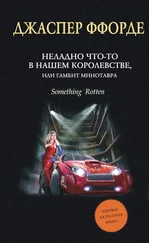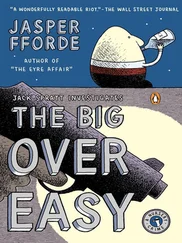One of Our Thursdays Is Missing
For Tif Loehnis
To whom I owe my career
and by consequence
much else besides


The remaking was one of those moments when one felt a part of literature and not just carried along within it. In less than ten minutes, the entire fabric of the BookWorld was radically altered. The old system was swept away, and everything was changed forever. But the group of people to whom it was ultimately beneficial remained gloriously unaware: the readers. To most of them, books were merely books. If only it were that simple. . . .
Bradshaw’s BookWorld Companion (2nd edition)
Everyone can remember where they were when the BookWorld was remade. I was at home “resting between readings,” which is a polite euphemism for “almost remaindered.”
But I wasn’t doing nothing. No, I was using the time to acquaint myself with EZ-Read’s latest Laborsaving Narrative Devices, all designed to assist a first-person protagonist like me cope with the strains of a sixty-eight-setting five-book series at the speculative end of Fantasy.
I couldn’t afford any of these devices—not even Verb-Ease™ for troublesome irregularity—but that wasn’t the point. It was the company of EZ-Read’s regional salesman that I was interested in, a cheery Designated Love Interest named Whitby Jett.
“We have a new line in foreshadowing,” he said, passing me a small blue vial.
“Does the bottle have to be in the shape of Lola Vavoom?” I asked.
“It’s a marketing thing.”
I opened the stopper and sniffed at it gingerly.
“What do you think?” he asked.
Whitby was a good-looking man described as a youthful forty. I didn’t know it then, but he had a dark past, and despite our mutual attraction his earlier misdeeds could only end in one way: madness, recrimination and despair.
“I prefer my foreshadowing a little less pungent,” I said, carefully replacing the stopper. “I was getting all sorts of vibes about you and a dark past.”
“I wish,” replied Whitby sadly. His book had been deleted long ago, so he was one of the many thousands of characters who eked out a living in the BookWorld while they waited for a decent part to come along. But because of his minor DLI character status, he had never been given a backstory. Those without any sort of history often tried to promote it as something mysterious when it wasn’t, but not Whitby, who was refreshingly pragmatic. “Even having no backstory as my backstory would be something,” he had once told me in a private moment, “but the truth is this: My author couldn’t be bothered to give me one.”
I always appreciated honesty, even as personal as this. There weren’t many characters in the BookWorld who had been left unscathed by the often selfish demands of their creators. A clumsily written and unrealistic set of conflicting motivations can have a character in therapy for decades—perhaps forever.
“Any work offers recently?” I asked.
“I was up for a minor walk-on in an Amis.”
“How did you do?”
“I read half a page and they asked me what I thought. I said I understood every word and so was rejected as being overqualified.”
“I’m sorry to hear that.”
“It’s okay,” he said. “I was also offered a four-hundred-and-six-word part in a horror last week, but I’m not so sure. First-time author and a small publisher, so I might not make it past the second impression. If I get remaindered, I’d be worse off than I am now.”
“I’m remaindered,” I reminded him.
“But you were once popular,” he said, “so you might be again. Do you know how many characters have high hopes of a permanent place in the readers’ hearts, only to suffer the painful rejection of eternal unreadfulness at the dreary end of Human Drama?”
He was right. A book’s life could be very long indeed, and although the increased leisure time in an unread novel is not to be sniffed at, a need to be vigilant in case someone does read you can keep one effectively tied to a book for life. I usually had an understudy to let me get away, but few were so lucky.
“So,” said Whitby, “how would you like to come out to the smellies tonight? I hear Garden Peas with Mint is showing at the Rex.”
In the BookWorld, smells were in short supply. Garden Peas with Mint had been the best release this year. It only narrowly beat Vanilla Coffee and Grilled Smoked Bacon for the prestigious Noscar ™Best Adapted Smell award.
“I heard that Mint was overrated,” I replied, although I hadn’t. Whitby had been asking me out for a date almost as long as I’d been turning him down. I didn’t tell him why, but he suspected that there was someone else. There was and there wasn’t. It was complex, even by BookWorld standards. He asked me out a lot, and I declined a lot. It was kind of like a game.
“How about going to the Running of the Bumbles next week? Dangerous, but exciting.”
This was an annual fixture on the BookWorld calendar, where two dozen gruel-crazed and indignant Mr. Bumbles yelling, “More? MORE?!?” were released to charge through an unused chapter of Oliver Twist. Those of a sporting or daring disposition were invited to run before them and take their chances; at least one hapless youth was crushed to death every year.
“I’ve no need to prove myself,” I replied, “and neither do you.”
“How about dinner?” he asked, unabashed. “I can get a table at the Inn Uendo. The maîtred’ is missing a space, and I promised to give her one.”
“Not really my thing.”
“Then what about the Bar Humbug? The atmosphere is wonderfully dreary.”
It was over in Classics, but we could take a cab.
“I’ll need an understudy to take over my book.”
“What happened to Stacy?”
“The same as happened to Doris and Enid.”
“Trouble with Pickwick again?”
“As if you need to ask.”
And that was when the doorbell rang. This was unusual, as random things rarely occur in the mostly predetermined BookWorld. I opened the door to find three Dostoyevskivites staring at me from within a dense cloud of moral relativism.
“May we come in?” said the first, who had the look of someone weighed heavily down with the burden of conscience. “We were on our way home from a redemption-through-suffering training course. Something big’s going down at Text Grand Central, and everyone’s been grounded until further notice.”
A grounding was rare, but not unheard of. In an emergency all citizens of the BookWorld were expected to offer hospitality to those stranded outside their books.
I might have minded, but these guys were from Crime and Punishment and, better still, celebrities. We hadn’t seen anyone famous this end of Fantasy since Pamela from Pamela stopped outside with a flat tire. She could have been gone in an hour but insisted on using an epistolary breakdown service, and we had to put her up in the spare room while a complex series of letters went backwards and forwards.
“Welcome to my home, Rodion Romanovich Raskolnikov.”
“Oh!” said Raskolnikov, impressed that I knew who he was. “How did you know it was me? Could it have been the subtle way in which I project the dubious moral notion that murder might somehow be rationalized, or was it the way in which I move from denying my guilt to eventually coming to terms with an absolute sense of justice and submitting myself to the rule of law?”
Читать дальше













![Джаспер Ффорде - Вечный кролик [litres]](/books/436518/dzhasper-fforde-vechnyj-krolik-litres-thumb.webp)
